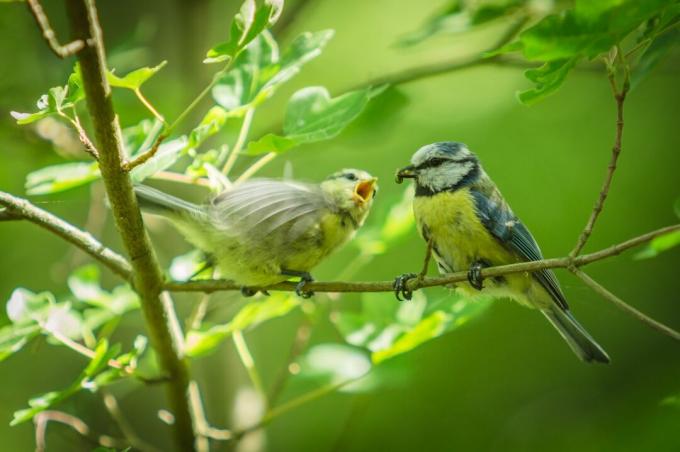What are nestlings and fledglings? How are young birds reared? What is the difference between nest stool and precocial? And when do birds fledge?

In the period from spring to summer, our garden birds are busy raising their young birds. Whether one, two or ten eggs - freshly baked bird parents have their wings full even after incubation and the hatching of the chicks. How exactly brood care takes place in birds, how far developed the little ones hatch from the egg and how much time and work is needed before the young birds themselves are considered adult birds, you can find out here in our large information article about bird nestlings and their Development.
contents
- Nestlings and fledglings: definition and differences
- brood care of birds
- What are precocial and precocial?
Nestlings and fledglings: definition and differences
As the name suggests, nestlings are young birds that are still in the bird nest belong and are completely dependent on the care of their parents. You can recognize nestlings by the fact that they are usually only sparsely feathered or even unfeathered and are not able to fly or feed themselves.

Fledglings, on the other hand, are young birds that have already left the nest but are still dependent to a certain extent on the care of their parents. Chicks are already making their first attempts to fly and can often still be found near the nest on surrounding branches.
tip: Exciting facts about courtship and the mating season of birds can be found in our special article on the subject bird mating.
brood care of birds
After young songbirds hatch from their eggs, they remain in the nest for another two to four weeks, depending on the species. During this time they are fed by their parents. Most baby birds are fed protein-rich insects and other animal foods, although the adult birds later become seed and grain eaters. In other groups of birds, such as birds of prey, the nestling period can last up to seven or eight weeks.
As soon as the young birds leave the nest, they are said to have fledged. Nevertheless, they are often provided with food by their parents for another two to four weeks. During this time, the youngsters can be observed, for example, during their first explorations in the garden.

Even after the little birds are on their own, they are still considered young birds. They only enter adulthood with the juvenile moult in winter or early spring. You can find more exciting information on the topic of moulting and the different plumages of birds in our special article on the topic "feathers of birds“.
What are precocial and precocial?
Birds can be born at different stages of development. Some species hatch from the egg already fully feathered and are already ready at this point evolved to be able to leave the nest very soon after hatching - hence the name precocial. However, this does not mean that the bird parents do not take care of the little ones after they have fled the nest. The young usually follow their parents out of the nest and are then led by them to feeding and sleeping places. Most precocial birds are waterfowl, such as swans, ducks or geese.

Nest stools, on the other hand, hatch naked and blind – without feathers and with closed eyelids – and are therefore completely dependent on the care and protection of their parents for the first few days. They usually receive very intensive brood care and only leave the nest after several weeks. Most songbirds, woodpeckers, pigeons, and even birds of prey are altricial.
Notice: The distinction between nestling and fledgling is usually only made with nest stools. Since precocials do not stay in the nest for long and are very independent from the start, this distinction makes little sense for them.
What you should do if you are a Baby bird found have depends greatly on its developmental stage. A practical recommendation for action in this case can be found in our special article.
...and receive concentrated plant knowledge and inspiration directly in your e-mail inbox every Sunday!



